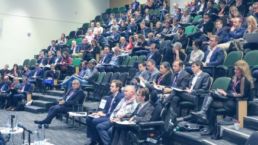The 5th edition of Host City took place this week in Glasgow, attracting over two hundred representatives of event hosts (cities), rights holders and a variety of service providers to sport and major events. Also in attendance was REDTORCH’s very own, Jonny Murch.
Here are our top five takeaways:
1. SOCIAL IMPACT GIVEN PRIORITY STATUS
Traditionally, and very broadly speaking, event hosts want to achieve three things as a direct outcome of hosting major sports events:
- Economic impact
- Media impact
- Social impact
Economic and media impact have had greater prominence in the past, and associated studies have produced ‘beauty’ numbers to help justify hosting (expense); however, there is a clear shift to prioritise social impact. Event hosts are asking: “How will an event help our city to look after the physical and mental well-being of our people?”
This shift in priority is something rights holders need to consider. Some rights holders will need to innovate the design and delivery of their events to make them more relevant to the question: “How can our event help you?”
As highlighted nicely by Callum Murray in his recent opinion piece, often social impact is not apparent immediately after an event, but in the years that follow. Because of this, all parties face a major challenge of measuring and communicating social impact to help guide event hosting decisions and strategies.
2. POLICY DRIVEN EVENT STRATEGY – CREATING PURPOSE
Robbie Clyde, Head of EventScotland stated the word ‘legacy’ should be banned. Instead, it should be the norm that events deliver long term benefits that fit the needs of the city. Such benefits should include greater health, wellbeing, education, science, culture, tourism, environment and business objectives.
Each event must have purpose and be completely aligned with city development and broader public policy. Given the financial challenges that exist in today’s world, cities need to maximise the impact of every event – squeezing each for all they are worth to benefit society. A major development in this is the publication of the OECD Recommendation of the Council on Global Events and Local Development, which describes ‘the framework conditions required to realise more sustainable global events and more effective delivery mechanisms and to build stronger capacities to leverage local benefit’. Download this publication from the IAEH website.
3. EVENTS STILL IMPORTANT FOR CITY BRANDING
Events remain very important to branding cities. They can help change perceptions, engage new audiences, mobilise audiences and overcome challenges. Glasgow’s hosting of the Commonwealth Games was cited as a great example of how a major event can change perceptions of a city.
Andrew Dixon highlighted the need for citizens to be engaged, positive, proud, included and excited about their city as they’re the ultimate brand advocates. If you don’t have your people on-side, you’ll have a challenge. Glasgow’s #PeopleMakeGlasgow campaign is a great example of a brand that galvanises a city’s population.
4. SEARCH FOR CONSISTENCY
Among different cities, there’s a variety of words, phrases and means used to describe and measure event impact. The International Association of Event Hosts (IAEH) is leading the attempt to standardise phraseology, so cities use a common language and direct comparisons can be made. Common impact measurement methodology is a much bigger challenge given the number of players in this sector; integrating economic, media, health, social, environmental (+++) and sport and activity impact means it is not simple. Portas Consulting are leading one new solution to the issue of standardisation with their Active Citizens Worldwide programme.
5. INDUSTRIES SAY NO TO REFERENDUMS
79% of the Host City audience believes referendums should not be used to decide whether a city should bid for a major sports event. Personal interest in the industry no doubt played a part in generating this response, but the argument is valid. The public is not familiar with long term city planning or public policy, nor do they understand how events may help fast track initiatives to improve both and save time and money (e.g. increase participation to reduce future health related costs associated with inactivity). Elected politicians must do their job of evaluating opportunities on behalf of people and do it thoroughly, transparently and objectively.
We know that articulating the benefits of bidding for major events is not easy and presently this responsibility seems to fall on the shoulders of cities. Perhaps sport should work harder to communicate the social impact and benefits of major events to help overcome this negative perception.
IT ALL COMES BACK TO PEOPLE
Ultimately sport must become more relevant to people living in and outside cities. It must be put into the context of people’s lives and daily challenges. It needs to answer the question “What’s in it for me?” for the average family and every public stakeholder group, so people understand why hosting a sports event in their city is a great thing and not just a cost.
At REDTORCH our data-driven approach increases the relevance and context of communications for audiences. We, like many, believe that sport (if managed and delivered well) can bring huge benefits to people, communities and nations. We understand there is no quick fix and will be working hard to help sport and cities try to win this communications conundrum in the years to come.





